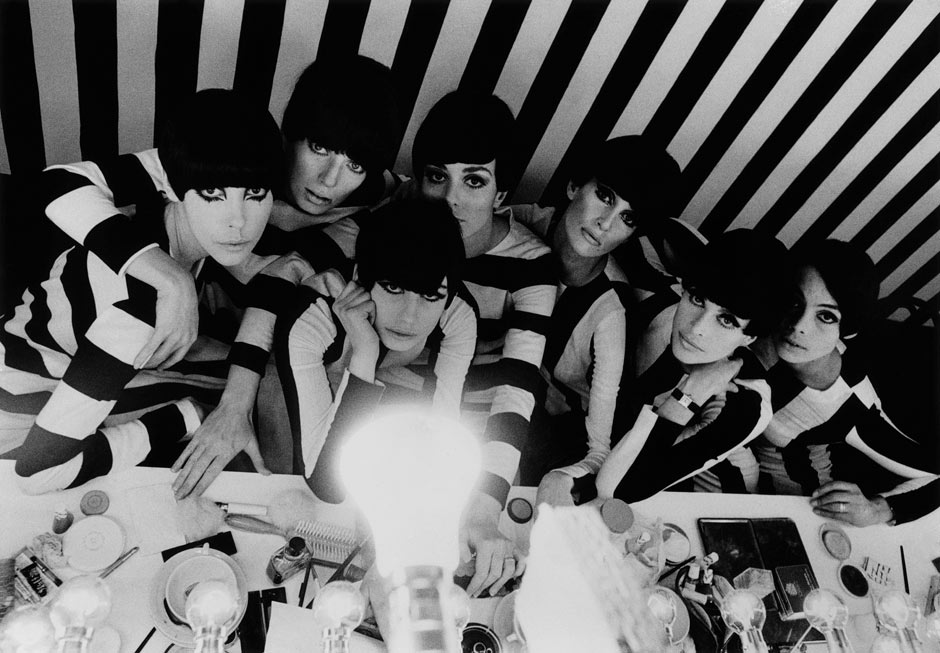This week, the second part of my series on Vogue patterns by Anna Sui. (See Part 1 here.)
5. Anna Sui, Spring/Summer 1999 collection
Sui’s Spring 1999 collection was inspired by American sportswear designer Claire McCardell. Nylon dresses invoked McCardell’s functionalism, while denim pieces developed the Americana theme. Further New World references ranged from Mexican clothing, Día de los Muertos handicrafts, and Haitian voodoo, to glam rock and Cecil B. DeMille’s Samson and Delilah (1949). (Browse the full collection at firstVIEW.)
Vogue 2305 is a pattern for two dresses with gathering details. View A is sleeveless, with a raised, drawstring waist and scarf collar; view B has a mock-wrap bodice, off-the-shoulder puffed sleeves, and a midriff cutout above the flared skirt:
Kirsten Owen and Giselle Bündchen modelled the dresses on the runway:

Models: Kirsten Owen and Giselle Bündchen. Photos via firstVIEW.
6. Anna Sui, Spring/Summer 2001 collection
One of the main inspirations for the Spring 2001 collection was the Mudd Club, a locus for New York’s cultural underground in the late 1970s and early 1980s. An Edo Bertoglio polaroid of Mudd Club co-founder Anya Phillips in her blue, lace-up dress was a reference for some of the pieces. (As well as being an independent fashion designer, Phillips was art director at Fiorucci; see Tim Blanks, “Mudd Quake.”) As Andrew Bolton notes, even the collection’s less overtly ’80s designs reflected Sui’s “Mudd Club thrift-shop punk aesthetic.” (See the full collection at style.com.)
Vogue 2551 is a pattern for two LBDs for stretch knits. The one-shouldered view A is cut on the bias, with the right skirt front extending into a twisted hip drape; view B has pleats at the right shoulder and a left side slit:
Here are the two dresses on the runway. The one-shouldered jersey dress was modelled by Hannelore Knuts:
These two Edo Bertoglio portraits from the Mudd Club era show Anya Phillips, in her blue dress, and Anna Sui (photos via New York Magazine; the Sui portrait was first published in Vogue Italia):
(More Mudd Club-era photos may be found in Maripolarama [powerHouse Books, 2005], which contains a recollection by Anna Sui.)
7. Anna Sui, Fall/Winter 2001 collection
Sui’s inspiration for her Fall 2001 collection was another legendary New York venue: the Factory, Andy Warhol’s studio. In reference to Warhol’s Factory parties and ideas about celebrity, the runway presentation incorporated a screening of a black-and-white, short film, commissioned from Zoe Cassavetes, of Sui’s famous friends attending a cocktail party. Other ’60s inspirations included “Baby” Jane Holzer’s eclectic wardrobe, the work of Rudi Gernreich, and William Klein’s film Who Are You, Polly Maggoo? (1966). (Full collection at style.com.)
Vogue 2640 is a pattern for a jacket and dress with contrast binding, plus a matching scarf:
Vogue 2640’s striped jacket and dress ensemble was the spring collection’s opening look:
The collection’s stripes are a reference to a particularly Op-art scene in Klein’s Who Are You, Polly Maggoo?:
8. Anna Sui, Fall/Winter 2003 collection
The concept of art deco skiwear inspired the Fall 2003 collection, which Sui designed during another cold winter (2002-3) when urban skiwear was dominating New York street fashion. In the colours, motifs, and especially the geometric patterns of art deco, as well as the distinctive, tubular 1920s silhouette, the collection chanelled the flapper’s modernity, but with a dose of fun fur. (Full collection on style.com.)
Vogue 7950 or 639 is a pattern for five different faux fur pieces: a jacket, vest, hat, mittens, and legwarmers. The jacket is cropped, with elbow-length sleeves, while the vest has an exposed zipper. The hat has a contrast scarf that could be made to match the mittens’ contrast palms and cuffs, and the legwarmers have elasticized leg bands:
Here are some detail shots of the hat and legwarmers on the runway:
L’Officiel’s collection image shows the ’20s ski theme, complete with Anna Sui-branded snowboard (click to enlarge):
Anna Sui’s work wears its postmodernity lightly. The designer’s myriad references, fantastical narratives, and hybrid concepts mean her collections keep evolving while staying true to a bohemian, thrift-store aesthetic. I’m already planning to make several of these (one of the hazards of research). Which are your favourites?
Tagged: 1990s, 2000s, Anna Sui, designer, fashion, ready-to-wear, sewing, Vogue Patterns











